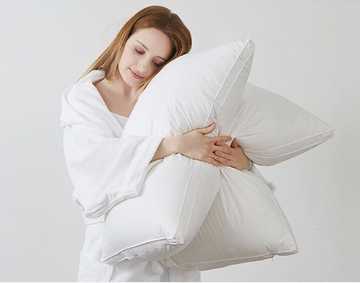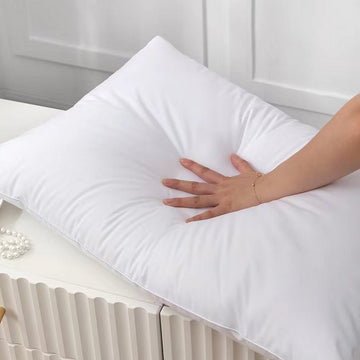Understanding the Importance of Pillow Selection for Sleep Quality
How Pillow Comfort Influences Sleep Cycles
The right pillow can make a big difference in sleep quality. It can affect how fast we fall asleep and how well we stay asleep. A comfy pillow can help complete a full sleep cycle. Each cycle has key stages. These stages are light sleep, deep sleep, and REM sleep. A bad pillow can make us wake up during these. This can lead to poor sleep and feeling tired the next day. It's key to choose a pillow that feels good and supports the head and neck right. This way, we can enjoy a full night of restful sleep.
 The Relationship Between Pillow Choice and Neck Alignment
The Relationship Between Pillow Choice and Neck Alignment
Choosing the right pillow is key for neck health. The wrong one can lead to pain. It can also harm your spine alignment. This may disturb your sleep. A good pillow should match your sleeping style. It will support your neck's natural curve. This reduces stress on your neck. It helps to prevent stiffness in the morning. Look for a pillow that keeps your head and neck level. It should not tilt them too high or too low. This balance is vital for a restful sleep.
Exploring Pillow Types and Materials
Comparing Different Pillow Fills: Pros and Cons
- Memory Foam: Molds to your shape, offering support. Can retain heat, which may be uncomfortable for some.
- Feather: Soft and luxurious, but might not provide enough neck support for all sleepers.
- Down: Very soft and light. It can cause allergies and requires regular fluffing.
- Latex: Firm and supportive, resists dust mites. However, it can be pricey and less cushy.
- Polyester: Affordable and easy to find. But it tends to flatten quickly and may need frequent replacing.
- Buckwheat: Good for cooling and support. The hulls inside can make noise when moved.
- Gel: Stays cool, which is great for hot sleepers. Some may find it too firm.
The Role of Pillow Firmness in Supporting Sleep Posture
Pillow firmness plays a key role in sleep quality. It affects how your head, neck, and shoulders align. If a pillow is too soft, your head might sink too far in. This can lead to neck strain. But if it's too hard, it may not give enough. This can also cause discomfort. You must pick a pillow that keeps your neck aligned with your spine. Side sleepers often need a firmer pillow. Back sleepers might prefer a medium firmness. Stomach sleepers usually need a softer pillow. The right firmness helps you sleep well. It prevents pain and stiffness in the morning.
Natural vs. Synthetic Pillows: Health and Environmental Considerations
- Natural Pillows: Natural pillows are made from materials like down, feathers, wool, or cotton. They are often more breathable and can provide a comfortable sleep experience. However, they may trigger allergies in some people and require more care in cleaning. Natural pillows are seen as eco-friendlier but can be more expensive.
- Synthetic Pillows: These pillows are filled with man-made materials, such as polyester fiber or memory foam. They tend to be hypoallergenic and easier to care for than natural pillows. Synthetic options often cost less and can be more durable over time. Yet, they may not offer the same breathability and can be less eco-friendly due to their production processes and materials.
Practical Tips for Choosing the Right Pillow
Assessing Personal Sleep Patterns and Positions
Choosing the right pillow starts with knowing how you sleep. Side sleepers often need a firmer pillow to fill the space between the head and mattress, keeping the spine straight. Back sleepers may prefer a flatter pillow to maintain the natural curve of their neck. Stomach sleepers usually benefit from a very thin pillow or no pillow at all to avoid strain on the neck. Consider your sleep habits when selecting a pillow to ensure proper support and comfort throughout the night.
When to Replace Your Pillow: Signs of Wear and Tear
- Flat or lumpy feeling: This may mean the fill has broken down.
- Neck or back pain: Sign that the pillow no longer gives proper support.
- Visible wear: Stains and rips are signs to get a new pillow.
- Allergy symptoms: These might get worse if pillow collects dust mites or mold.
- Age: Replace pillows every 1-2 years for hygiene.
- Washing issues: If the pillow does not hold shape after wash, it's time to change it.
Expert Advice for Testing Pillows Before Purchase
Before you buy a pillow, consider these expert tips. Test the pillow in the store if you can. Lay it on a flat surface. Press down with your hand. See how fast it springs back. A good pillow returns to shape quickly. Also, rest your head on it. It should support your neck well. Check the pillow's firmness. It must match your sleep style. Soft for stomach sleepers, firm for side sleepers. Lastly, look at the care label. Pick a pillow you can clean easily.






